September 2025 League of Nebraska Municipalities
All About DWEE: The Nebraska Department of Water, Energy, and Environment
This article was written by the Nebraska Department of Environment and Energy. More articles, tools, and resources can be found at dee.ne.gov or email the NDEE public information office at ndee.moreinfo@nebraska.gov.
On May 7, 2025, Gov. Jim Pillen signed LB 317 into law, officially merging the Nebraska Department of Environment and Energy (NDEE) with the Nebraska Department of Natural Resources (NeDNR). This merger created a unified agency: the Nebraska Department of Water, Energy, and Environment (DWEE). This change reflects a significant milestone in Nebraska’s commitment to protecting and managing our environmental and natural resources. The new department became effective July 1, 2025.
By bringing together the complementary missions of NDEE and NeDNR, DWEE is better equipped to serve Nebraska’s people, communities, and environment through a more integrated and efficient approach. From water management and energy policy to environmental protection, DWEE continues – and expands on –the vital work of its predecessor agencies.
This article will continue to highlight the agency’s programs, people, and impact – but now under a new name that reflects its broader mission and reach. Guided by a strong mission, vision, and core values, the agency is focused on partnerships, stewardship, and innovation.
1335 L Street
Lincoln, NE 68508
(402) 476-2829
info@lonm.org
DWEE’s Mission, vision, and values
Mission: DWEE is committed to protecting and enhancing Nebraska’s water, energy, and environmental resources through science-based decision-making, strong partnerships, and cooperative efforts.
Vision: A Nebraska where water, energy, and environmental resources are sustainably managed and safeguarded through effective communications, collaboration, innovation, and stewardship –ensuring the prosperity of our communities and agricultural-based economy for future generations.
Values:
• CUSTOMERS: We will consider the impact to our customers in everything we do; customers can be internal and external to the agency.
• COMMUNICATION: We will effectively communicate throughout our organization and with our customers.
• CULTURE: We will create a proactive culture of excellence that promotes teamwork and
collaboration with each other and our customers, agency and stakeholder integrity, resource stewardship, science-based decision-making, and innovation.
• COLLABORATION: Proactively identifying effective solutions to support our customer’s needs.
• STEWARDSHIP: We are dedicated to the responsible management of Nebraska’s water, energy, and environmental resources – protecting these vital resources today, so they remain abundant and productive for future generations.
• SCIENCE-BASED DECISIONMAKING: Utilizing the best available data and research to drive informed policies and practices.
• INNOVATION: We embrace new ideas and always ask, “How can we provide more value?”
For more information, visit dwee.nebraska.gov or contact us at DWEE.moreinfo@nebraska.gov.
Check out the League’s Facebook page at www.facebook.com/leaguene. Be sure to “Like” us.
Lash Chaffin Utilities Section Director Jackson Sash
Safe lifting and material handling
By Jackson Sash, Utilities Field Rep./Training Coordinator
Utility work can involve a lot of moving and lifting, whether it is hauling tools from a truck, handling vault lids, or moving equipment in the shop. These are everyday tasks, but they can take a toll if they are not done carefully. Back strains and pulled muscles are some of the most common injuries in maintenance and utility work, and most of them can be prevented with a little planning and good technique. Safe lifting begins before you
touch the load. Take a few seconds to look at what you are about to move and decide on the best way to handle it. If it looks heavy or awkward, get a coworker to help or use a dolly, chain hoist, or lifting straps. Whenever possible, use equipment instead of muscle power. Position your feet shoulder width apart, get close to the object, and bend at your knees instead of your waist. Keep your back straight, tighten your stomach muscles, and lift smoothly with your legs. If you need to turn, move your feet instead of twisting your back.
Before you pick up the load, make sure your path is clear. Watch for cords, hoses, tools, or wet spots that could cause a slip or trip. Set the load down the same way you picked it up, by bending your knees and keeping your back straight. Whether you are in the field or in the shop, lifting safely protects more than just your back. It keeps your shoulders, knees, and joints from wearing out over time. Taking a few seconds to plan each lift is a small effort that can prevent a painful injury and keep everyone working safely throughout the year.


Winter safety around the office
By Jackson Sash, Utilities Field Rep./Training Coordinator
As the days get shorter and the temperatures begin to drop, most of us start spending more time inside. For office staff, that means settling into the colder months with the heater running, windows shut tight, and maybe even a space heater tucked under the desk. While these small comforts help make the winter more bearable, they also bring a few risks that are easy to overlook when everyone is just trying to stay warm.
One of the most common winter hazards in the office is the space heater. They can be a real blessing in a drafty corner, but they need to be treated with care. A space heater should always be plugged directly into a wall outlet – never into a power strip or extension cord. Those cords can overheat and start a fire before anyone even notices something is wrong. Heaters should be kept at least three feet away from anything that can burn, such as papers, boxes, or furniture. It is
also a good idea to use heaters that have an automatic shut-off switch in case they get knocked over. And when you head home for the day, always unplug the unit.
Power strips themselves can be a problem, especially when they start carrying more load than they are meant to. In winter, offices tend to plug in all sorts of extra devices – space heaters, coffee makers, humidifiers, or festive decorations. If the strip feels warm to the touch or cords look worn, it is time to replace them. Cords should never be run under rugs or across doorways where they can fray or trip someone.
Outside the office, another major concern is slipping and falling. As snow and ice accumulate, entryways become dangerous zones. Meltwater can refreeze overnight, making an invisible layer of ice right where people step. Regularly salting or sanding walkways, keeping entrance mats dry, and posting “wet floor” signs when needed are simple ways to prevent injuries. Employees should take it slow when coming in from
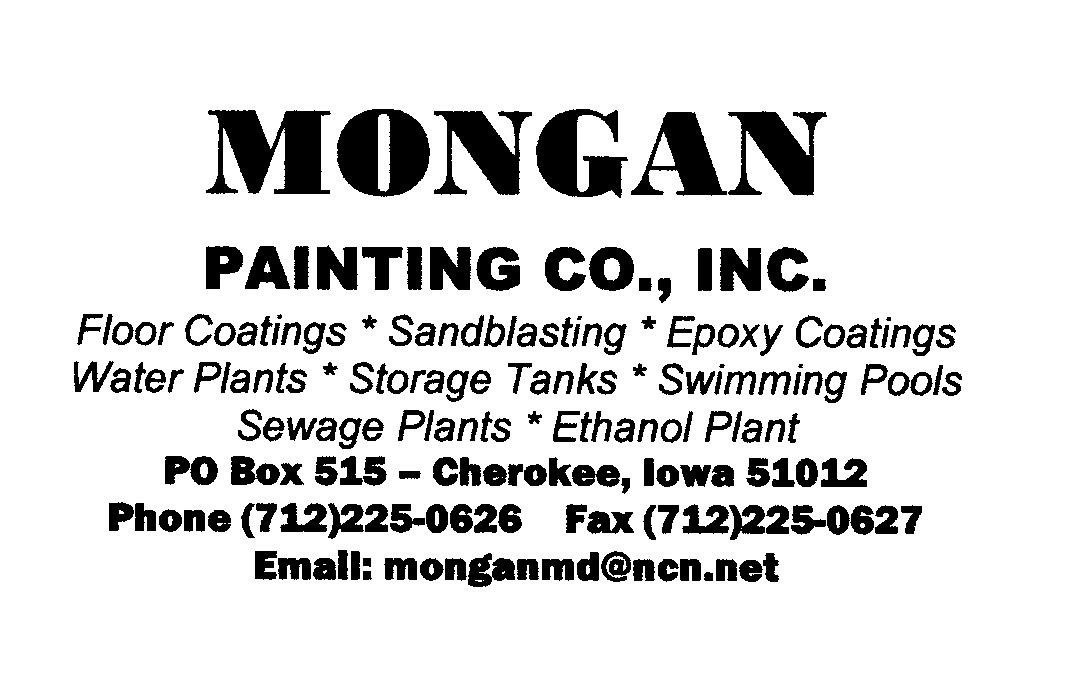
outside and wear shoes with decent traction until they get indoors.
It also pays to look up. Snow and ice can build up on roofs, gutters, or awnings, and when temperatures rise, they can fall in large chunks without warning. A heavy icicle or sheet of snow sliding off a roof can cause serious injuries or damage. Avoid walking directly under overhangs or roof edges during thawing conditions, and alert maintenance if you see dangerous buildup forming overhead.
As offices close their windows for the winter and the heat kicks on, another concern quietly appears: indoor air quality. Stale air, dust, and reduced ventilation can lead to stuffy offices and irritated sinuses. If the building has a furnace or central heating system, make sure air filters are replaced on schedule. Dust and debris that accumulate during the off-season can get blown through the ductwork when the system starts up, affecting both comfort and health. Humidifiers can help keep the air from getting too dry,
Continued on page 4

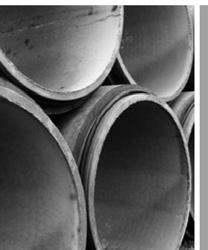
Winter safety around the office
Continued from page 3
but they need regular cleaning to prevent mold growth.
And while we are on the topic of heating systems, carbon monoxide safety deserves special attention this time of year. Carbon monoxide is a colorless and odorless gas produced by burning fuels, and it can build up when furnaces, boilers, or space heaters are not properly vented or maintained. Symptoms of exposure can include headache, dizziness, nausea, or confusion, and they can come
on quickly. Offices should have carbon monoxide detectors in areas near mechanical rooms or where fuel-burning appliances are located, and batteries should be checked regularly. If anyone ever feels unwell and suspects a leak, the building should be evacuated immediately and maintenance or emergency services called before reentry.
It is easy to think of winter safety as something that mostly applies to outdoor work, but offices have their own share of risks once the weather
turns cold. From overloaded outlets to slick entryways, from stale indoor air to hidden gases, small oversights can quickly turn into larger problems. Taking the time now to check heaters, test detectors, and clear ice before it builds up can make a big difference as winter sets in.
Staying warm should not come at the cost of safety. A little awareness, a few good habits, and a watchful eye for each other will help keep everyone comfortable and safe until spring rolls back around.
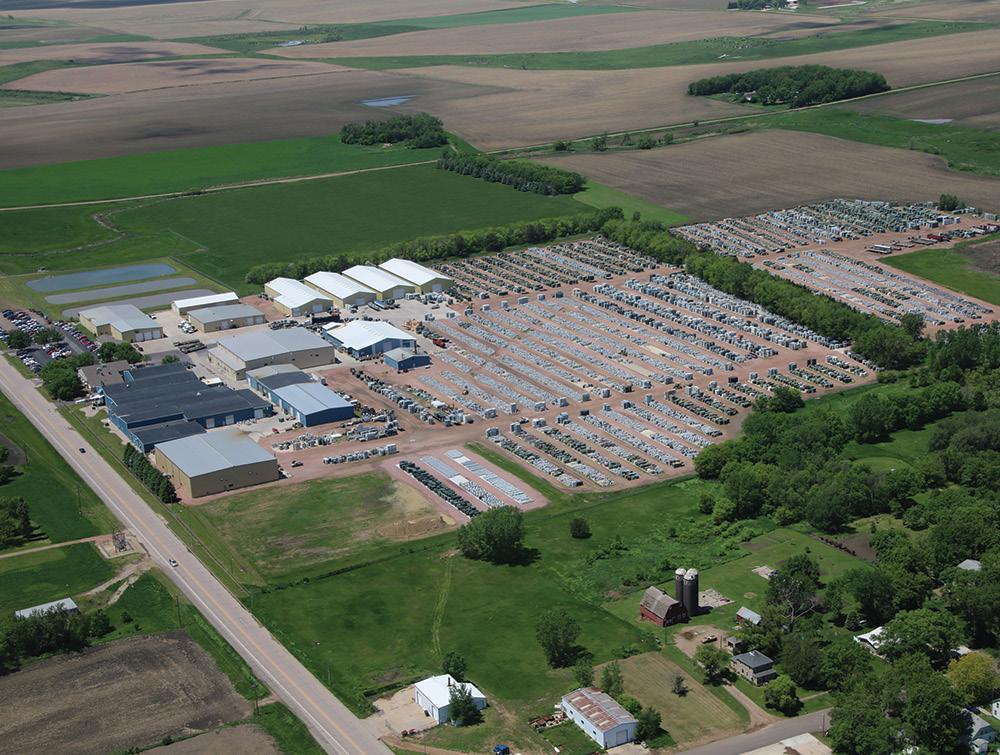

Preparing for winter before it arrives
By Jackson Sash, Utilities Field Rep./Training Coordinator
You may be thinking, “It’s only September! Do I really need to be preparing for winter weather already?” The answer is yes – absolutely! While Nebraska typically gets most of its winter weather in January and February, late fall or early winter storms are not unheard of. Snow in September is uncommon, but it has certainly happened before. On Sept. 29, 1985, most of eastern Nebraska experienced its earliest snowfall
after summer. Lincoln and Omaha received some snow, albeit not much: 0.8 inches and 0.3 inches respectively. Further west, Kearney and Hastings both received 6 inches in the same storm. In the panhandle and north-central Nebraska, earliest snowfalls after summer have occurred even earlier, closer to midSeptember. Scottsbluff received 3 inches on Sept. 12, 1974, Chadron recorded 1 inch on Sept. 13, 1970, and Ainsworth had 2 inches on Sept. 16, 1973. Clearly, snow in early fall is a possibility that must be considered.
Future “Snowball” Wastewater Conferences
The dates for future “Snowball” Wastewater Conferences are scheduled and contracts are signed with the Kearney
Holiday Inn. Please note the upcoming Snowball Conference schedule: Jan. 28-29, 2026 Jan. 27-28, 2027 Jan. 26-27, 2028
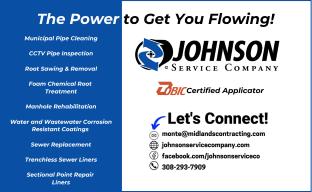
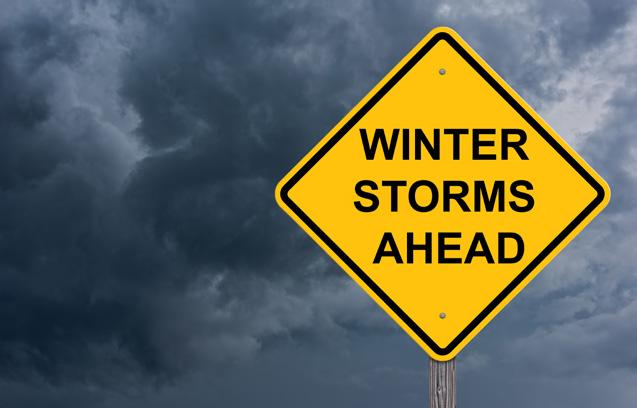
With that in mind, fall is the time to start preparing for what winter may bring. Municipalities that take the time now to maintain their equipment, plan for emergencies, and ensure their crews are ready will be far better positioned once the first snowflakes fall.
One of the first steps is making sure vehicles and snow removal equipment are ready to go. Plow trucks, graders, and salt spreaders should all receive thorough inspections well before they are needed. Hydraulic systems, blades, chains, and lighting should be checked for wear and repaired or replaced as necessary. Fuel systems need to be clean and winterized, and backup parts such as cutting edges and hydraulic hoses should be stocked to avoid downtime during
Continued on page 6
Engineering a world where everyone thrives.
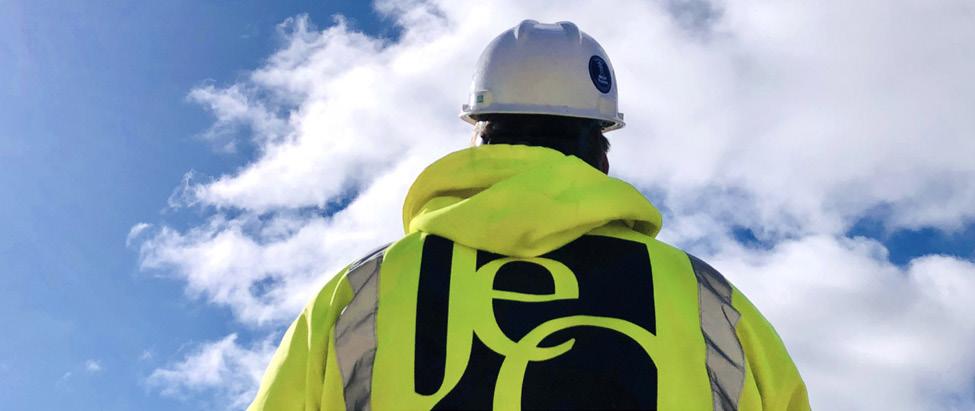
Preparing for winter before it arrives
Continued from page 5
storms. Even smaller items like snow blowers and portable generators benefit from preseason tune-ups. A breakdown in the middle of a storm doesn’t just slow down response – it can also create safety hazards for the community.
Another critical step is ensuring backup power options are in place for essential infrastructure.
Wastewater treatment plants, water supply wells, and lift stations are all vulnerable to outages during major snow or
ice events. Having tested and reliable generators available, along with adequate fuel supplies, can make the difference between a temporary inconvenience and a major service disruption. Municipal buildings such as fire stations, police departments, and public works garages also need dependable backup power so they can continue operating no matter the weather. Testing these systems now helps avoid unpleasant surprises later. Salt, sand, and deicing material inventories
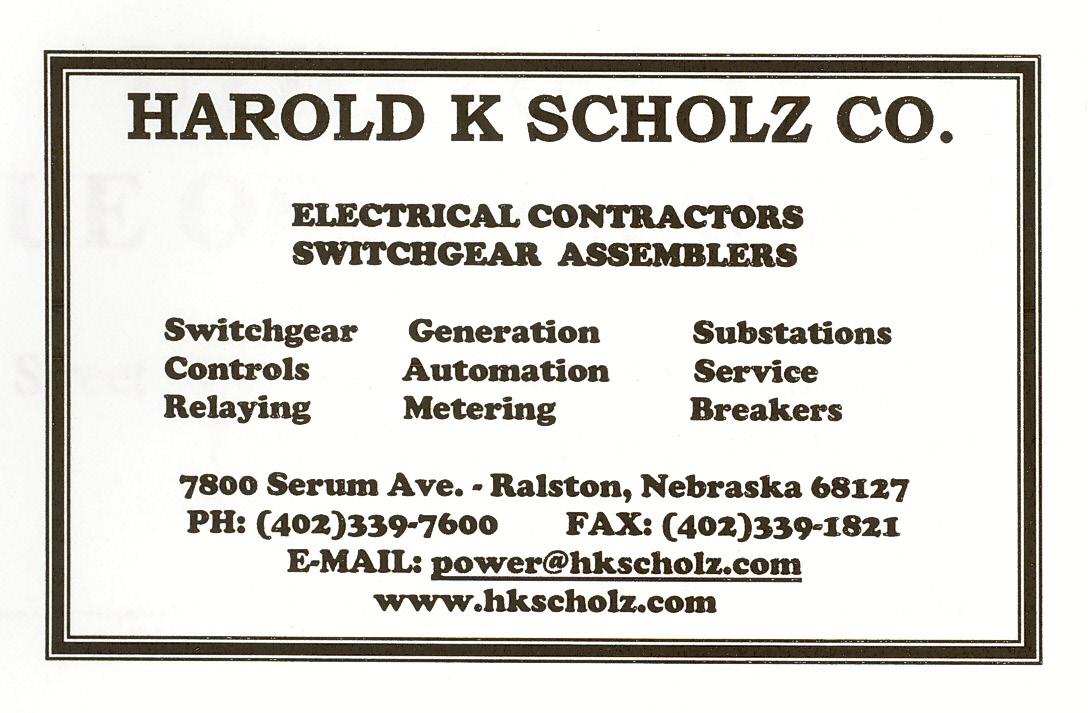
should also be reviewed and replenished early. Delays in ordering or delivery can leave a municipality short-handed at the very moment materials are needed most. Similarly, planning snow routes, identifying priority areas such as hospitals and schools, and reviewing staffing schedules helps ensure that everyone knows their role when winter arrives. Many municipalities also take the opportunity in the fall to conduct refresher training for employees, particularly those who may be operating equipment or working long shifts in hazardous conditions.
Finally, winter preparation goes beyond equipment and supplies – it also involves communication. Residents need to know what to expect when storms hit. Making sure that public communication systems are up-to-date, whether
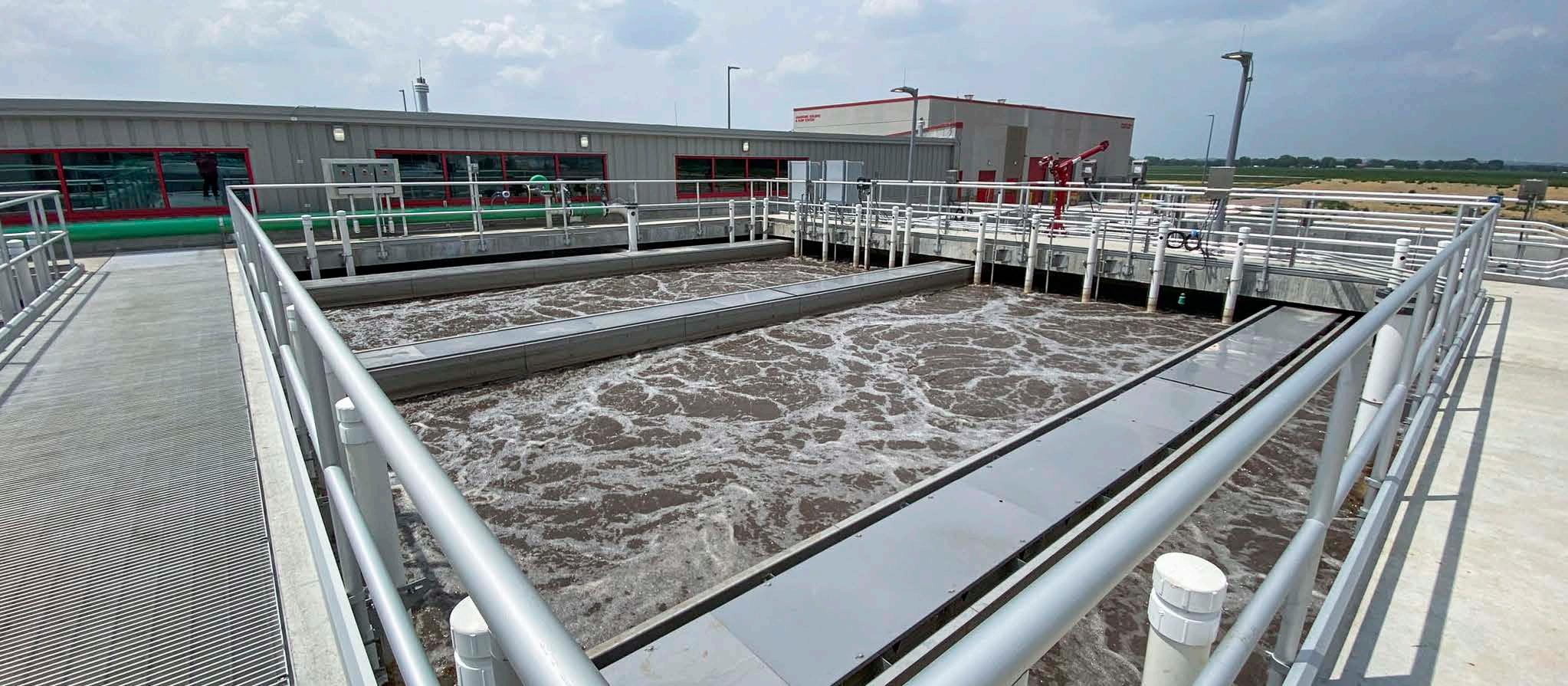
through websites, social media, or automated call systems, helps keep the public informed about road conditions, parking restrictions, and safety precautions. Internally, having clear chains of command and emergency contact lists ensures that employees can respond quickly and efficiently.
While the first measurable snow may still be weeks or months away, history reminds us that it can arrive sooner than expected. By taking the time in September and October to prepare equipment, check backup systems, stock supplies, and train staff, municipalities can set themselves up for a safer and smoother winter season. Early preparation not only helps keep essential services running – it also reassures residents that their community is ready for whatever Mother Nature sends our way.
we’re helping our clients push open the doors to what’s possible, every day.
Utilities Section Newsletter
Classifieds
Water/Wastewater Operator
I. The City of Wayne is seeking applications for a full-time Water/ Wastewater Operator I position. The wage range for this position is $19.43 to $26.11 and includes group health insurance and retirement benefits. Applications and job description are available at the City of Wayne, 513 Main Street, Wayne, Nebraska. Applications are due by Oct. 10, 2025, and should be returned to the City Clerk’s office, 513 Main Street. City of Wayne is an EOE. For more information, call 402-375-1733 and ask for Wes Blecke, City Administrator.
City Administrator. The City of Burwell is accepting applications for the position of City Administrator. The City of Burwell is the county seat of Garfield County and has approximately 1,200 residents. Burwell is located seven miles from the Calamus Reservoir in Central Nebraska. The municipality owns, operates, and provides electric, water, and wastewater services to its residents. Law enforcement is under the direction of the County Sheriff’s Department. This position requires comprehensive knowledge of municipal finance, expertise in city, state, and federal laws, regulations and guidelines, strategic planning, and supervisory skills. Individuals should possess a degree in a related field and/or possess a level of education that together with experience and training gives the required knowledge and experience to perform the duties as City Administrator. This person serves the community at the direction of the Mayor and City Council. Salary is negotiable based on experience and qualifications and includes competitive benefits. Interested
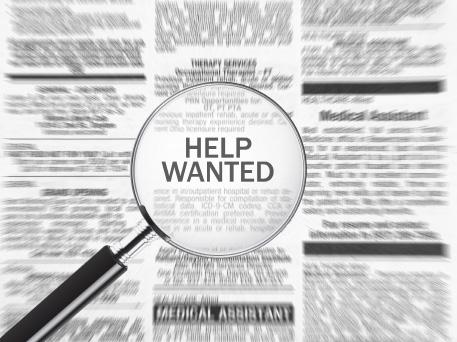
candidates should contact the City Office at 404 Grand Avenue (PO Box 604), Burwell, NE 68823 or phone 308-346-4509. Completed application along with a cover letter and resume should be mailed or delivered to the city office address above or emailed to cityofburwell@ nctc.net and will be accepted until the position is filled. The City of Burwell is an EOE.
Utility Superintendent. The City of Rushville is hiring an Utility Superintendent. This is a full-time position, Monday through Friday, 7 am - 4 pm with a one-hour lunch period and on call every third weekend. We are looking for a self-starting individual to supervise all operations (excluding Library and Clerk staff) of and/or perform cleaning and maintenance on alleys/sewer/street/park/public areas, perform skilled work in the operation and maintenance of equipment; function as municipal sexton, meter reading, and general utility/maintenance worker. Oversees or performs the sweeping, patching of streets, sign installation, snow removal, and grading and graveling of alleys. Will also assist in grave digging and funeral setup, park maintenance, and general construction as needed. This position would be accountable to the City Mayor. Applicators and
Grade 4 Water Operator's licenses are necessary within 6 months of hire date. Individual would be required to live within 20 minutes of Rushville city limits. Minimum requirements include: High School graduate or G.E.D. with the ability to perform skilled labor and/or maintenance as demonstrated by previous work experience. One (1) to three (3) year's supervisory experience, record keeping, and budgetary experience preferred. Must be self-directed and possess the ability to work well with the public and coworkers. Medium to heavy equipment experience required. Starting pay $65,000$72,000 based on experience and current certifications. Benefits are included. To apply, please submit a cover letter and resume by emailing rushcity@gpcom.net or stopping by the Rushville City Hall from 8 am - 4:30 pm M-F. Applications will be reviewed on a rolling basis. This position will be advertised until filled. Interviews will be held on October 20 and 21.
Utilities Section members only
Do you have equipment to sell or a position to fill? Place your ad in the Classifieds section of the Utilities Section Newsletter free. This service is a membership benefit. Contact Brenda Henning at the League office at 402-4762829, fax to 402-476-7052 or email your ad to brendah@ lonm.org.
Utilities Section Newsletter
2025/2026 Training calendar
Visit our website for a complete list of workshops and conferences.
2025
October
Oct. 21
Water Operator Training Workshop Fire Hall, Gering
Oct. 22 ......... Water Operator Training Workshop ........................... Water Shop, North Platte
Oct. 23 ......... Water Operator Training Workshop ........................... Engineering Building, Grand Island
December
Dec. 9 ........... Water Operator Training Workshop ........................... Joe Hampton Conference Center, Lincoln
Dec. 10 Water Operator Training Workshop Columbus
2026
January
Jan. 7-9 ......... Utilities/Public Works Section Annual Conference.... Embassy Suites, Lincoln
Jan. 27 Water Operator Training Workshop Holiday Inn, Kearney
Jan. 28-29 ..... Snowball Conference ................................................. Holiday Inn, Kearney
February
Feb. 3-4 ........ Nebraska Meter Conference ....................................... Holiday Inn, Kearney
Feb. 23-24 .... Midwinter Conference ................................................ Cornhusker Marriott Hotel, Lincoln
Utilities Section Executive Board
President Pat Heath City Administrator Gering
1st Vice President Gary Thurlow Utility Supt. Atkinson
2nd Vice President
Sarah Sawin Director of Utilities Kearney Past President
Duane Hoffman Public Works Director Oxford
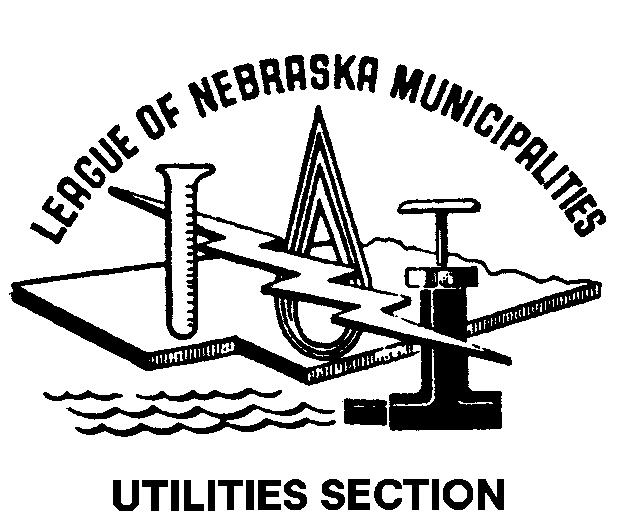
Board Member Matt Owens Water & Sewer Supervisor Imperial
Board Member
Jeramie Van Leer Utility Superintendent Ord
Board Member Ryan Schmitz Utilities Director Grand Island
Ex Officio Member
Kyle Svec City Admin./Utilities Supervisor Geneva
